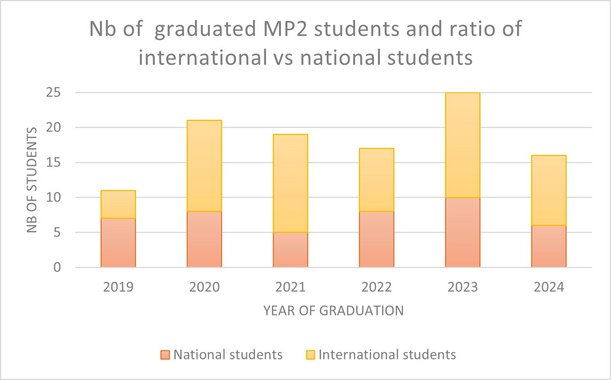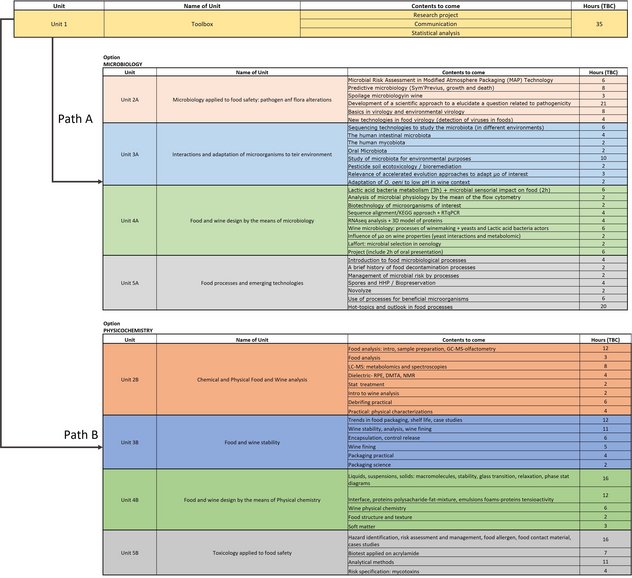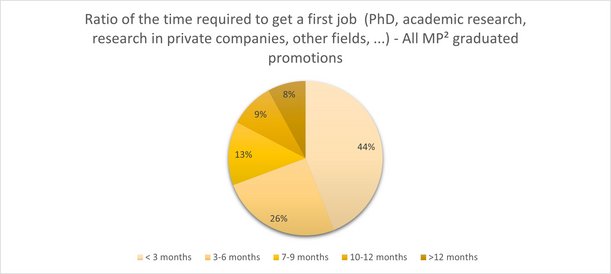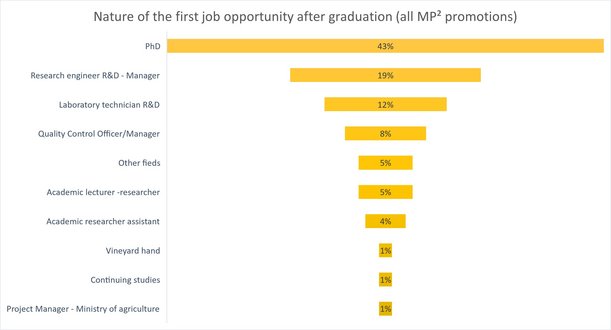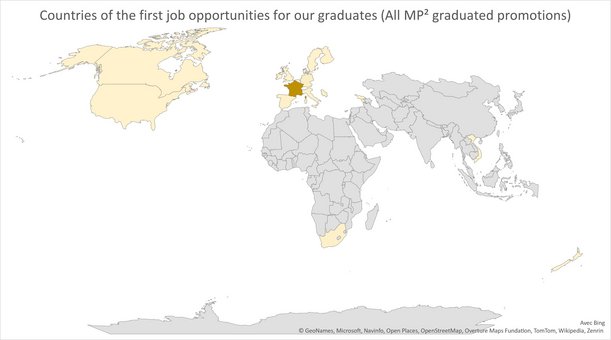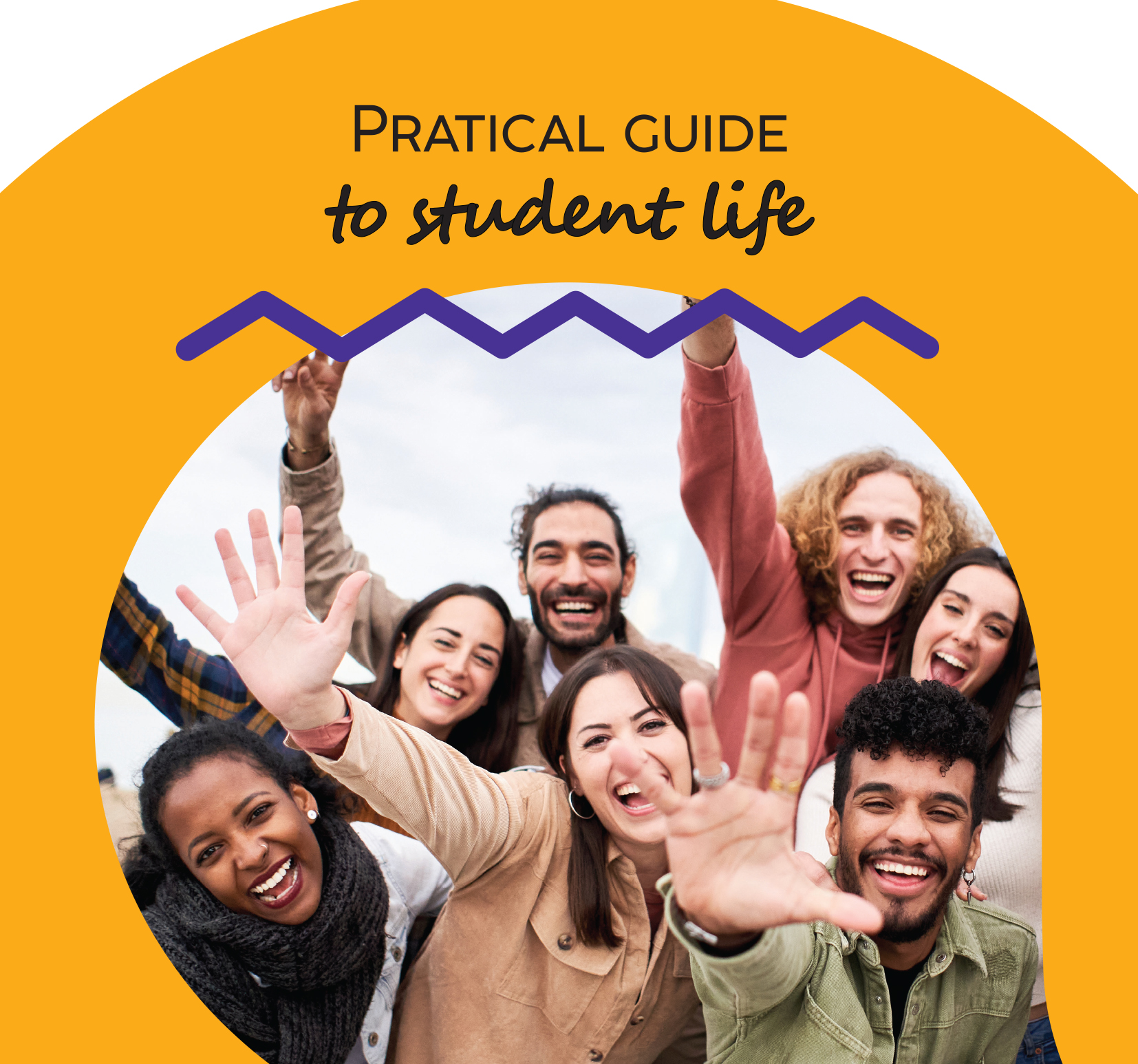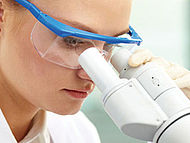
Microbiology and Physicochemistry for food and wine processes: MP²
Latest News
APPLICATION CAMPAIGN FOR 2026/2027
- M1 & M2 MP2:apply at ecandidat.institut-agro.fr from 2 March to 17 May 2026
- International students must apply on the E-candidat platform even if they have already applied on Etudes en France.
- However, after admission, international students who are concerned will have to register on Etudes en France/Campus France for further steps.
BGF SCHOLARSHIPS
If you apply for a BGF scholarship to enter this Master, please do not hesitate to contact us for more information.
THE EIFFEL SCHOLARSHIP CAMPAIGN
- We do not accept Eiffel applications anymore. End of campaign = November, 15.
DURATION
Face-to-face courses
TAUGHT IN ENGLISH
B2 Level required
ACADEMIC MOBILITY + INTERNSHIP
in Semester 2 and Semester 4, respectively
Apprenticeship + "Contrat pro"
Alternation (apprenticeship/Apprentissage or contrat de professionalisation) is possible in M1 and M2 for French students.
International students may apply to apprenticeship in M2 under conditions.
The responsibility for finding a company wishing to welcome the student and establishing the contract belongs to the student.
→ For more information, contact the MP2 email address.
What is the difference between Apprenticeship and "Contrat de Professionnalisation":
“Apprentissage”: https://www.service-public.fr/particuliers/vosdroits/F2918
“Contrat de Professionalisation” https://www.service-public.fr/particuliers/vosdroits/F15478
Presentation
The Master MP² welcomed the first promotion of students in 2018 and graduated for the first time in 2019.
MP² is a 2 year, course-based, full-time international research Master's Degree focused on Microbiology and physico-chemistry applied to food and wine processes. This master aims at training future researchers and managers of the food and wine science and industry.You will have a strong international mobility. One semester will be out of France in the first year and another one is possible during the second year. The modules are indicative of those offered in this program. This is based on the current organization and may change year to year in response to new needs in the food industry.
Our international Master MP² shares the first semester in M1 with our other international Master P2FOOD for common basis in food microbiology, sensory analysis and statistics in particular. After that, the teaching objectives, the course organisation and the contents are different. Note that the requirements to enter the Master P2FOOD are not the same than for MP². The two Masters lead to two different career paths. Make sure you consider it when applying to one of the Masters or both.
Everything you need to know to apply and join the programme
The application procedure will run from from March 2 to May 17, 2026 for all international students. The same dates apply for French students or international students holding of a French Bachelor’s degree.
It will be done via our platform E-candidat. At this stage, the platform Etudes en France-Campus France is not used.
https://ecandidat.institut-agro.fr/
Complementary form to fill in and download when applying- “Form_comp_MP2_2025-2026”
- Identity photo
- Passport or identity card
- Copy of the highest diploma obtained with the diploma supplement
- For a degree in progress: photocopy of the year's transcripts and certificate of transcripts and certificate of completion (to be sent as soon as possible).
- Photocopy of the transcripts of the 3 years of Bachelor and 1st year of Master (if concerned); including your ranking
- Cover letter in English including your expectation from this master degree and your professional project
- Curriculum Vitae detailed in English, including information on work placement
- MP² Supplementary Form (to download at on the E-candidat platform when applying)
- Copy of English certificate (if applicable)
- Letter of recommendation (2 max) (in connection with the requested training)
- Any document you wish to bring to our attention
Applicants must hold a Bachelor’s Degree or equivalent (180 ECTS) in biology, food science, chemistry, physical chemistry or engineering science. Those having completed a Master’s Degree or equivalent (240 ECTS) related to biology, chemistry or physical chemistry can apply directly to the 2nd year.
The university level (grades) and a strong interest for the sector adds value to your file. This interest can be shown by an experience in this field (internship, project, and experiences) and/or explained in the cover letter. From your cover letter, the selection committee will expect to better understand your background, your expectations about the Master's degrees and your professional objectives. This will be even more important if you are planning to take your studies back or change your field of study. the professional project
1. Send your application on e-candidat. Depending on your profile and background, you may apply to both M1 and M2 (two different applications on the same platform).
2. The administrative team will check your documents and define if your application is complete or not. If not, you will be contacted to provide the missing documents. Tip: From the moment the statud “complete” is given to your application on e-candidat, an answer must be sent within the two following months.
3. Your files are sent to the Selection Committee who will review it during their meetings.
4. The Selection Committee may answer in different ways:
- Not selected → The students are informed quickly on e-candidat
- Pre-selected for an interview → Requires some extratime to define the interviews schedule.
- Fully admitted (concerned very specific profiles such as Eiffel scholars or former students…) → informed quickly on e-candidat
- Not selected for M2 but proposed for a pre-selection interview in M1 (background in M2 not adapted) → the student is contacted to define wheher he/she agrees on this proposition and is willing to be interviewed. If not, a refusal is officially given. If yes, the student is included in the next pool of interviews.
5. In case you are invited for an interview: It is a videoconference that lasts about 30 min, in English. Students receive in advance a list of scientific articles. They have to choose one and work on it for the interview. During the interview, the Selection Committee will ask questions about the selected article, the student's background, his/her professional objectives, etc.
→ If you have a disability (all types of disabilities) and this may have an impact on the interview, you can, if you wish, inform the MP2 team in advance by writing to the contact address (right upper frame)
6. The Selection Committee informs the administrative team about the final decision
7. The final decision is informed on e-candidat. In case of admission, the student will have a delay (usually 10 to 15 days - may vary) to confirm on e-candidat this proposition. If not confirmed, the proposition will be withdrawn.
The MP² Master's program offers high-quality training, attractive to industrialists and universities looking to recruit young graduates specialized in the microbiology or physicochemistry of food and wine, with strong international experience. To reinforce the international profile of our graduates, we have chosen to offer a Master's degree 100% taught in English, with a compulsory academic mobility and a recommended 6-month internship abroad, if possible.
In addition, it was important for the program to be able to welcome international students with different academic, professional and personal backgrounds. To this end, we welcome a very large number of international students from M1 right through to graduation, representing an average of 60% of the graduating class.
International students come from all horizons, all continents and all countries (for example, South Africa, Ghana, Lebanon, Vietnam, India, China, Pakistan, Russia, Armenia, Montenegro, Belgium, Switzerland, Mexico, Colombia, etc.).
The programme being taught 100% in English, the expected English level is B2.
Candidates for whom English is not their mother tongue or who haven’t done their studies in English will have to give a certificate to attest of their English level. The following tests will be accepted as a certification of the required English level (valid certificate necessary) :
- CECRL : level B2 minimum
- TOEFL : 87 points minimum
- TOEIC : 785 points minimum
- BULATS : 60 points minimum
- First Certificate English of Cambridge
- Bright Language Test : level 3 minimum
- IELTS : 6
- Duolinguo English Test: 110-125 minimum
- EF SET 50 MIN or 90 MIN (15 min not allowed) - LEVEL B2
Such a document is not necessary for candidates for whom English is their mother tongue, or who have validated a minimum of one semester in English. However, in both cases, the candidates must absolutely mention it in their application file and bring any proof (school certificate for exemple, transcripts) to confirm it.
There is no requirements of French level to enter the Master. International students will follow French courses (FLE - French as a Foreign Language) when entering the programme. If you have bases in French, follow courses in the past or have a certification in FLE, please indicate it in your CV and add any proof of it, in order to anticipate registration to FLE courses.
TUITION FEES
Differenciated prices for international students will be applied. The Higher Education and Research Ministry has just voted the new tariffs for 2025/2026.
- For French and UE students, the tuition fees was around 254€/year for the tuition fees + ~ 105€/year for the Student Life contribution fee.
- For international students (non UE), the tuition fees was around 3941€/year + ~105€/year for the student Life contribution.
The amounts may vary from year to year based on the Ministry's decision.
SCHOLARSHIPS
Our institution does not normally offer scholarships. However, financial support could be provided under circumstances for few months. Also, students have the possibility to apply to CROUS social funds, upon arrival and after meeting a social worker.
Usually, the international MP² students have to financially cover expenses for 2 full semesters: semester 1 and semester 3 done in Dijon. Semester 2 involves an academic mobility among our institutional partners. An Erasmus scholarship is requested to partially or fully cover the living expenses abroad. Also, at this occasion, regional scholarships can be requested in addition. Semester 4 implies a 5-6 months internship in France or abroad. If done, in France, hosting institutions/companies must pay trainees 4.35€/h (hourly rate in 2024).
Students on a work-study contract with a company receive a monthly salary (based on various criteria).
To find scholarship opportunities, you can visit the Campusbourses website : campusbourses.campusfrance.org/fria/bourse/
Two others with some extra opportunities (broader scope but more difficult to find at the Masters' level)
(1) www.scholarshipportal.com/
(2)https://euraxess.ec.europa.eu/funding/search
(3) fondationdelavocation.org/poser-sa-candidature
THE EIFFEL SCHOLARSHIP
A student does not apply on his own to the scholarship of Excellence EIFFEL. He/she is supported by a Higher Education Institution. Each institution supports a limited number of candidates. This application to this scholarship is highly competitive.
Website: https://www.campusfrance.org/fr/le-programme-de-bourses-france-excellence-eiffel
For this programme, we will consider candidates with transcripts of an excellent level - Rank A+ - 80% (First class Honors) and with a profile that fits with the requirements.
Documents to send us to apply:
- A photocopy of your passport (identity page) or identity document.
- Your curriculum vitae, written in English (1 to 2 pages).
- Your diplomas and ranking: this must specify your performance, which must be justified by: distinction, ranking rank, situation within the promotion, number of students in the promotion, diplomas with indication of the specialty, the date obtained, mentions and final grades certified by the establishment.
- Your transcripts from the last three years referring to a course completed both in France and abroad.
- English certificate or diploma (see the section about language requirements for the accepted certificates)
- Your professional project, written in English (1 to 2 pages). You must write his project in a form that allows you to explain the choice of studies in France in relation to previous studies and future professional career. This presentation may possibly be supported by an opinion from people outside the establishment, for example belonging to a company.
If your profile is interesting, an interview (at distance) will be done with the pedagogical team. At the end, they will accept or not to support your application to Eiffel.
Here is the timeline decided by our institution:
- Send your documents as soon as possible.
- Interviews and decisons will be made by November 1, 2025.
- The candidate get access to the Eiffel platform and submit its documents by November 15, 2025
- The supervisor of the programme checks the documents and validate on the Eiffel platform by December 10, 2025.
- The international relations office checks and confirms the application on the Eiffel platform by January 8, 2026.
COSTS OF LIVING IN DIJON
Apart from the tuition fees and CVEC contribution that you have to pay every year (CVEC = 100€ - 2024/2025 - may change every year), you have to consider the cost of living in Dijon.
For more information: https://institut-agro-dijon.com/life-linstitut-agro-dijon/living-in-france
Discover the 2-year programme
Here is an overview of the organisation of the teaching units and modules in the first semester.
For more details, please look at the syllabus.
All courses take place at l'Institut Agro Dijon, face-to-face.
The teaching units 1 to 5 are taught in common to MP2 and P2FOOD students (our other international Master).
TIME FOR AN ACADEMIC MOBILITY
During semester 2, students leave for an academic mobility amongst our European partners. With the help of our international relations Department, the students will benefit from the Erasmus + programme and will be partially or fully financially supported. Also, it will be possible to apply for complementary scholarships from the Burgundy Franche-Comté region.
Based on the schedule of our academic partners, most of the S2 mobilities go from February to July. Though, some exceptions are possible depending on the hosting instution organisation.
The list of academic partners can vary from year to year.
How do you choose where to go?
The list of partners for the year is presented to M1 students in September-October. Depending on the students' career objectives as well as their background, the pedagogical team will discuss with the students the best “option” for them.
The international relations Department will then officially designate the student to the host insitution. After approval on their side, the student will generate a learning agreement (following a specific procedure). This document will be signed by all parts.
Here is an incomplete list of partners:
ITALY: UNISA - Università degli studi di Salerno ; Università Politecnica della Marche (Ancona); UNITE - Università degli studi di Teramo ; Università degli studi di Padova
HUNGARY: MATE - Hungarian University of agriculture and Life Sciences
BELGIUM: Ghent University ; Université de Liège
GERMANY: University of Hohenheim
SWEDEN: Chalmers Teckniska Högskola Ab. Goteburg
THE GRADING
The number of ECTS to obtain during the mobility is 30 ECTS. After receiving the Transcripts of Records (TOR) from the host institution and make sure the student has obtained the expected number of ECTS, the Institut Agro Dijon will automatically recognize it.
If the number of ECTS obtained is not sufficient, the student will have to take the catch-up exam offered by the host institution.
Tip: We recommend to apply to more courses there in order to compensate a possible failure at the exam and get the 30 ECTS despite this.
SPECIAL SITUATIONS PREVENTING THE ACADEMIC MOBILITY
The academic mobility of semester 2 is mandatory and part of the programme.
However, some situations prevent from leaving:
1) Students with a work-study contract cannot leave as their time is shared between the IAD and the work company
2) Students with specific scholarships as Eiffel or BGFs. The principle of those scholarships is to fund living expenses when the student is in France. If leaving, the scholarship is normally suspended. However, a beneficitary student can negociate with in Campus France Counselor.
A back-up programme coupled with a short internship is proposed in Dijon for students obliged to stay.
The third semester is done at l'Institut Agro Dijon, face-to-face.
At the end of the second semester, you are asked to choose your career path between two options: Microbiology or Physicochemistry.
Regarding your choice, teaching units 2 to 5 are adapted to each specialty with different teaching units, modules, contents, hours, and so on.
The unit 1 is taught in common.
The new course programme is under construction for the 2025-2026 academic year. Here are the elements available which may change in the coming months.
The fourth semester corresponds to a 6-months internship in France or abroad, in a research lab (private companies, academic institutions…). It counts for 30 ECTS.
To validate this internship, the student will write a report and defend his work in front of a jury.
Meet the pedagogical team
The pedagogical responsible for the MP2 programme - option Microbiology is Stéphane Guyot (PAM, IAD).
A majority of the pedagogical team involved in the teaching of MP2 comes from the research unit PAM.
Acronyms:
Employing institution
UBE : Université Bourgogne Europe, IAD : Institut Agro Dijon, INRAE: Institut National des Recherches pour l'Agricultulture, l'Alimentation et l'Environnement, ANSES: Agence Nationale de Sécurité sanitaire de l’alimentation, de l’Environnement et du travail
Attached Research Units:
PAM : UMR Procédés Alimentaires et Microbiologiques (Dijon), Agroécologie : UMR Agroécologie (Dijon), CHU : hôpital de Dijon, LUBEM : unité de recherche (Quimper)
For the 1st year of the Master:
- Pr Laurent Beney (PAM, IAD)
- Dr Géraldine Klein (PAM, UBE)
Dr Louise Basmaciyan et Pr Frédéric Dalle (PAM, CHU, UBE)
For the 2nd year of the Master:
- Pr Laurent Beney
- Dr Laurent Gal (Agrécologie, IAD)
- Dr Hélène Licandro (PAM, IAD)
- Pr Rémy Cachon (PAM, IAD)
- Pr Hervé Alexandre (PAM, UBE)
- Dr Gaël Belliot (PAM, CHU)
- Dr Sandra Martin-Latil (ANSES)
- Pr Louis Corroler (LUBEM, Université de Bretagne Occidentale)
- Dr Sébastien Terrat (Agroécologie, UBE)
- Dr Pierre Lapaquette (PAM, UBE)
- Dr Louise Basmaciyan et Pr Frédérique Dalle
- Pr Yves Waché (PAM, IAD)
- Pr Raphaëlle Tourdot-Marechal (PAM, UBE)
- Dr Chloé Roullier-Gal (PAM, UBE)
- Pr Jean-Marie Perrier-Cornet (PAM, IAD)
- Dr Fabrice Martin (Agroécologie, INRAE)
- Dr Sébastien Dupont (PAM, IAD)
Non-academic speakers in M2
Joana Coulon : Biolaffort
DimaCell : Spectroscopic Imaging Platform (IAD, UBE) - English page under construction
Pierre-Alexandre Juan : Novolyze (Daix, near Dijon)
The pedagogical responsible for the MP2 programme - option Physicochemistry is Elias Bou-Maroun (PAM, IAD).
As for microbiology, the majority of the pedagogical team involved in the teaching of MP2 comes from the research unit PAM.
Acronyms:
Employing institution
UBE : Université Bourgogne Europe, IAD : Institut Agro Dijon,
Attached Research Units:
PAM : UMR Procédés Alimentaires et Microbiologiques (Dijon), CTM : Center for Center For Translational and Molecular medicine
For the 1st year of the Master:
- Pr. Camille Loupiac (PAM, IAD)
- Pr. Dominique Champion (PAM, IAD)
- Dr. Nicolas Sok (PAM, IAD)
- Dr. Laurence Dujourdy (IAD)
- Pr. Régis Gougeon (PAM, UBE)
- Dr. Maria Nikolantonaki (PAM, UBE)
Dr. Natalia Quijada-Morin (PAM, UBE)
For the 2nd year of the Master:
- Dr. Isabelle Séverin (CTM, IAD)
- Pr. Marie-Christine Chagnon (CTM, IAD)
- Dr. Elias Bou-Maroun (PAM, IAD)
- Pr. Ali Assifaoui (PAM, UBE)
- Pr. Régis Gougeon (PAM, UBE)
- Pr. Camille Loupiac (PAM, UBE)
- Dr. Maria Nikolantonaki (PAM, UBE)
- Pr. Dominique Champion (PAM, IAD)
- Dr. Laurence Dujourdy (IAD)
- Pr. Thomas Karbowiak (PAM, IAD)
- Pr. Odile Chambin (PAM, IAD)
- Dr. Aurélie Lagorce (PAM, IAD)
Invited speakers:
- Pr. Ana Juan-Garcia (University of Valencia, Spain)
- Dr. Fabrice Cousin (CEA: Atomic Energy Commission, France)
- Dr. Stéphanie Devineau (University Paris Cité, France)
- Dr. Patricia Lopez-Sanchez (Institute of Marine Research, Spain)
- Pr. Fabrice Neiers (Bourgogne Europe University, France)
- Pr. Eric Marchioni (University of Strasbourg, France)
- Dr. Daniele Carullo (University of Milan, Italy)
Job openings
This Master’s Degree aims at providing students with job-relevant competencies and skills for a career as research project leader in academic laboratories, research institutes or R&D departments of international companies. The expertise will be in the field of microbiology and microbiological processes, chemistry and physical chemistry applied to food and wine science. Students will be encouraged to perform a PhD after this master degree.
Follow-up on our graduates
We are proud to say that a large majority of MP² graduates find their first job less than 6 months after graduation. The academic mobility in S2, the 6-month internship in S4 and the organization of the course with numerous individual and group projects, in response to industrial demands, help students to quickly understand market needs and find appropriate solutions. Encounters with academic and industrial professionals throughout the course also enable them to build up a rich address book that they can quickly call upon to prepare for their entry into the world of work.
The Master MP² is first and foremost a Master's degree with a research focus, whether in the academic, institutional or industrial sphere.
Unsurprisingly, almost half of our graduates go on to doctoral studies.
The remainder go straight into R&D in private companies. Others will choose to work in the academic world in teaching-research positions or as research assistants. A few will also choose to work in fields not directly related to the Master's disciplines.
It is also interesting to note (not visible on this graph) that some graduates who started out directly in R&D use this professional experience to embark on a PhD a few months later with CIFRE funding (paid for by the company).
About 65% of our graduates (international students included) find their first job in France. Graduates who start a thesis will also join European university research laboratories, which are often partners of our school.
Finally, some international students will choose to return to their home country and take up a position with a local company or institution.
Contactez-nous
Tuition fees are reviewed annually.
Tuition fees for the 2025/2026 academic year are :
- for EU students enrolled in initial training in M1 and M2: 254 euros
- for non-EU students enrolled in initial training in M1 & M2: 3,941 euros
